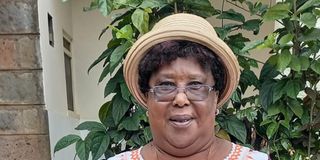Premium
From grim diagnosis to cancer-free: Muthoni's 15-year battle with colon cancer

Lydia Muthoni Kabinja has battled colon cancer for the last 15 years. She is now cancer-free after beating the disease.
What you need to know:
- 15 years on, Lydia Muthoni Kabinja is standing strong, defying the odds and sharing her extraordinary journey with the world, a feat that has inspired her to write a book called "Tender Soul, Warrior Spirit".
- In 2016, she was told that she was free of the growing cancer cells, after being diagnosed with stage 3 colon cancer.
Cancer does not discriminate; it knocks on doors uninvited and shatters lives in its wake. For most, a diagnosis is met with fear, anxiety and a cloud of uncertainty. But in the darkest of storms, some stories whisper to our hearts that life can prevail against the cruellest of odds. The story of Lydia Muthoni Kabinja is one such story.
"I got colon cancer in 2005, and was operated on at the time," she recalls. "I was worried because getting cancer at that age is very risky, and chances of survival are typically low," Muthoni reveals. But what followed was a journey of unwavering determination and a spirit that refused to give in to despair.
Colon cancer became Muthoni's new norm, which, as she described in our chat, "is a diagnosis that often comes with a grim prognosis". But 15 years on, she is standing strong, defying the odds and sharing her extraordinary journey with the world, a feat that has inspired her to write a book called "Tender Soul, Warrior Spirit".
According to Dr Alfred Mogaka, a gynaecologist/oncologist at Kenyatta National Hospital, colon cancer cases in Kenya are increasing at an alarming rate.

Lydia Muthoni Kabinja is standing strong, and defying the odds by beating colon cancer.
“We are getting more and more alarming cases of colon cancer, and patients come in with abdominal pain, and blood in stool, which are common signs. It is treatable through a series of tests and treatments, including chemotherapy, and radiotherapy, and if it’s done well... we can eliminate the disease. But for some people, it may recur.”
Just a year after her surgery, Muthoni began experiencing relentless stomach pains, which eventually led to her second diagnosis. "That's when my daughter took me to Kenyatta National Hospital, where I was admitted and had 13 X-rays, one of which showed that it was a growth of colon cancer," she says. The fight against cancer was far from over.
Dr Mogaka explains: “For cases where the cancer may recur, we do a follow-up surveillance. The patient is reviewed every three months where we do a colonoscopy or CT scan to make sure it does not recur, if the follow-up is done for five years and no disease is found within that period, then we can confidently declare the patient cured of cancer.”
Muthoni says that when she was diagnosed, "I thought I had 2-3 years to live, but now it’s been 15 years."
"In 2016, I was told that I was free of the growing cancer cells, after being diagnosed with stage 3 colon cancer," she shares, highlighting the tremendous progress she made in her battle against the disease.
After she was diagnosed, her son, an unwavering pillar of support, took her to India for chemotherapy, where she received the necessary medication. “I was there for three months, where they removed the growth in my colon, and thereafter they did chemotherapy.”
But Muthoni’s journey wasn't without its ups and downs, as she spent years in and out of hospital. "I have been in and out of hospital over the years, but eventually I was told I'm recovering well. But I have never been the same because I got diabetes and high blood pressure. But I still live regardless," she adds.
Muthoni revealed that it was only after treatment that she developed type 2 diabetes and hypertension. “I got diabetes and hypertension post-chemotherapy. They are the complications that followed after my surgery and treatment,” she shared.
“Sometimes the chemotherapy drugs can affect other organs like the liver and pancreas because immunity reduces as a result of the drugs for some people that can trigger diabetes, especially if they were already at risk of getting diabetes,” Dr Mogaka affirmed.
Muthoni added that the chemotherapy left her feeling and looking different. “You really change a lot because your body turns black everywhere, and you lack appetite.”
Speaking about managing diabetes and hypertension, Muthoni added, “I went to a nutritionist who helped me with a good diet regimen. With a good diet, I managed to control diabetes while still taking my medication."
“The risk factors that colon cancer patients need to worry about is the intake of a lot of carbohydrates and processed foods because they prevent proper digestion and many of them [are high in] glucose,” Dr Mogaka cautioned.
Colon cancer is one of the most common cancers worldwide. It often affects people over the age of 50, and the chances of survival depend on early detection and treatment. Colon cancer develops when tumours form in the large intestine, and often causes no symptoms in the early stages. When diagnosed at a later stage, the prognosis can be grim.




